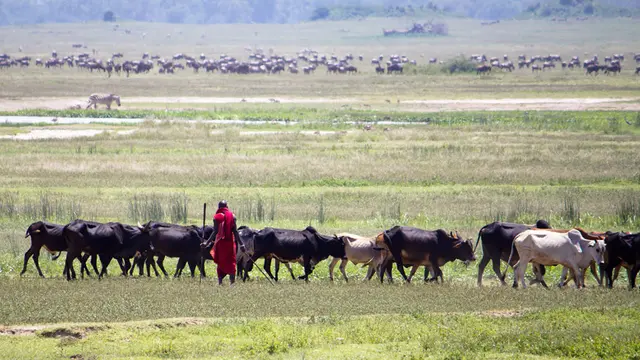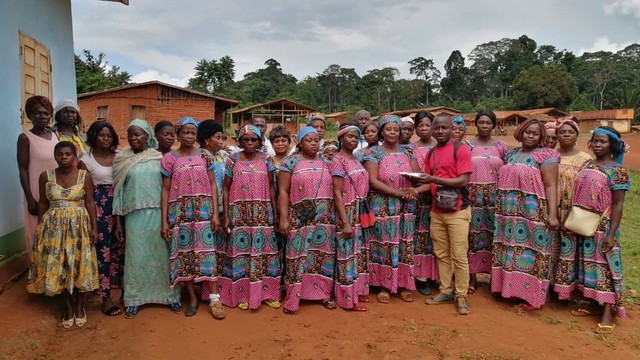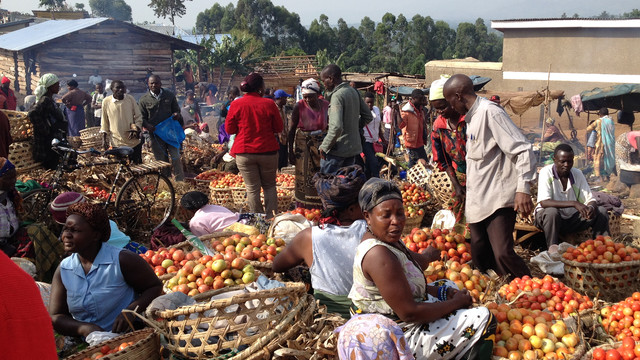Climate change adaptation and resilience: an interactive learning journey
As actors on the frontline of climate action are forced to adapt to thrive, IIED is facilitating a learning journey with MISEREOR partner organisations to strengthen their project, systems and processes to respond to climate risk and uncertainty in their own context.
Senior researcher (strengthening partnerships team), Climate Change research group

Dominador and Marilou Macaya prepare freshly harvested carrots in Alimodian, Iloilo, Philippines. The Macaya farm grows diverse crops and tends livestock, using energy and nutrient (re)cycling. This Diversified and Integrated Farming System helps ensure reliable harvests despite climate-related calamities, while also mitigating the increasing impacts of the changing climate (Photo: Kervin Bonganciso)
Climate change involves tackling uncertainty and recognising differentiated impacts in individuals and groups. And dealing with complex problems like these requires a multi-directional approach that brings together the knowledge of multiple stakeholder groups in iterative cycles of learning, action and reflection.
MISEREOR observes that some of its partner organisations and target groups are already adapting quite successfully to the climatic changes and impacts of climate change, while others seem to still struggle or reach limits of adaptation.
Many partners do respond to actual changes while not having time, personnel or access to deepen their understanding of the changes to come in a 2-4°C hotter world. For MISEREOR and its partners, it is crucial to prepare for the changes to come and to climate-proof actions of today for sustainable outcomes of all interventions.
IIED’s framework for social learning enables collective knowledge co-creation and action. By blending knowledge systems, sharing lessons learned across regions, and actively questioning institutional practices, this approach can lead to institutional change, allowing learning to actively enhance the potential to address ‘wicked’ problems such as climate change.
What is IIED doing?
In this pilot project, IIED is working with its partner MISEREOR to co-design and deliver an interactive learning journey in close collaboration with partner organisations, that goes beyond theory into the practical application of concepts, tools and good practice.
Through interactive learning workshops participants learn fundamental climate change concepts, tools, and approaches; exchange lessons and best practices and engage with invited speakers.
This process facilitates the adaptation of tools to interrogate their climate capabilities and impacts, enabling them to develop a roadmap for integrating climate risk into projects and institutional structures that is contextually relevant.
The workshops introduce cross-cutting lenses that partner organisations can apply to their projects, governance and decision making. The basic learning outline covers:
- Recognising and assessing climate change risk and vulnerability; understanding priorities and enabling institutions
- Climate change, governance and equity/climate justice
- Climate finance fundamentals
- Monitoring, evaluation and learning for climate adaptation, and
- Adaptation options: a deep dive into technical aspects of an ongoing or future project.
Gender and intersectional considerations are mainstreamed into each of the learning modules.
Each stage builds on previous lessons and encourages MISEREOR partner organisations to follow up their ongoing work and at the same time bring in new insights and identify ways for going further in enhancing locally-led climate action, drawing on the principles for locally led adaptation, specifically the principles of ownership, subsidiarity, context specificity, interactivity and peer-to-peer learning.
Following the initial phase, based on partners’ expressions of interest, selected partner organisations will work with the IIED team to strengthen their organisation’s climate adaptation approach based on previously identified priority themes.
The programme creates spaces for horizontal peer-to-peer learning, allowing partner organisations to share lessons learned across geographies.
Objectives and learning outcomes
By the end of this reflexive learning journey, MISEREOR desk officers and partner organisations should have:
- A deeper understanding of the climate crisis and its impacts on their work
- A roadmap toward integrating climate change into their lead projects and institutional strategies to build climate-resilient institutions
- An understanding of and capacity to use a set of tools that will facilitate deeper thinking, and
- Access to a peer network to expand their professional networks and learning capacities, facilitating future discussion, collaboration and learning, including on future training and learning needs.
Additional resources
Principles for locally led adaptation, Marek Soanes, Aditya V. Bahadur, Clare Shakya, Barry Smith, Sejal Patel, Cristina Rumbaitis del Rio, Tamara Coger, Ayesha Dinshaw, Sheela Patel, Saleemul Huq, Muhammad Musa, M Feisal Rahman, Suranjana Gupta, Glenn Dolcemascolo, Tracy Mann (2021), IIED Issue Paper
Solving “wicked” problems: can social learning catalyse adaptive responses to climate change?, Marissa Van Epp, Ben Garside (2016), IIED working paper


